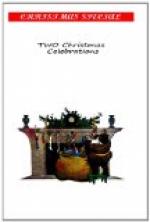At the next house, Miss Robinson liked it; but hoped she “would not ask that family o’niggers,—that would make it so vulgar;” and she took a large pinch of Scotch snuff, and waddled off to finish her ironing. Mrs. Deacon Jackson—she was a second wife, with no children—hoped that “Sally Bright would not be asked, because her father was in the State Prison for passing counterfeit money; and the example would be bad, not friendly to law and order.” But as Aunt Kindly went out, she met the old Deacon himself,—one of those dear, good, kind souls, who were born to be deacons of the Christian religion, looking like one of the eight beatitudes; and as you stopped to consider which of that holy family he most resembled, you found he looked like all of them. “Well!” said he, “now ma’am, I like that. That will be a Christian Christmas,—not a Heathen Christmas. Of course you’ll ask all the children of ’respectable people;’ but I want the poor ones, too. Don’t let anybody frighten you from asking Sip Tidy’s children. I don’t know that I like colored folks particularly, but I think God does, or he would not have colored ’em, you know. Then do let us have all of Jo Bright’s little ones. When I get into the State Prison, I hope somebody’ll look after my family. I know you will. I don’t mean to go there; but who knows? ’If everybody had his deserts, who would escape a flogging?’ as the old saying is. Here’s five dollars towards expenses; and if that ain’t enough, I’ll make it ten. Elizabeth will help you make the cake, &c. You shall have as many eggs as you want. Hens hain’t laid well since Thanksgiving; now they do nothing else.”
Captain Weldon let one iron cool on the anvil, and his bellows sigh out its last breath in the fire and burn the other iron, while he talked with Aunt Kindly about it. The Captain was a widower, about fifty years old, with his house full of sons and daughters. He liked it. Patty, his oldest daughter, could help. There were two barrels of apples, three or four dollars in money, and more if need be. “That is what I call the democracy of Christianity,” said the good man. “I shall see half the people in the village; they’ll be in here to get their horses corked before the time comes, and I’ll help the thing along a little. I’ll bring the old folks, and we’ll sing some of the old tunes; all of us will have a real old-fashioned good time.” Almira, his daughter, about eighteen years old, ran out to talk with Kindly, and offered to do all sorts of work, if she would only tell her what. “Perhaps Edward will come, too,” said Kindly. “Do you want him?” asked Almira. “Oh, certainly; want all the LOVERS,” replied she,—not looking to see how her face kindled, like a handsome morning in May.
One sour old man, who lived off the road, did not like it. ’Twas a Popish custom; and said, “I always fast on Christmas.” His family knew they did, and many a day besides; for he was so covetous that he grudged the water which turned his own mill.




